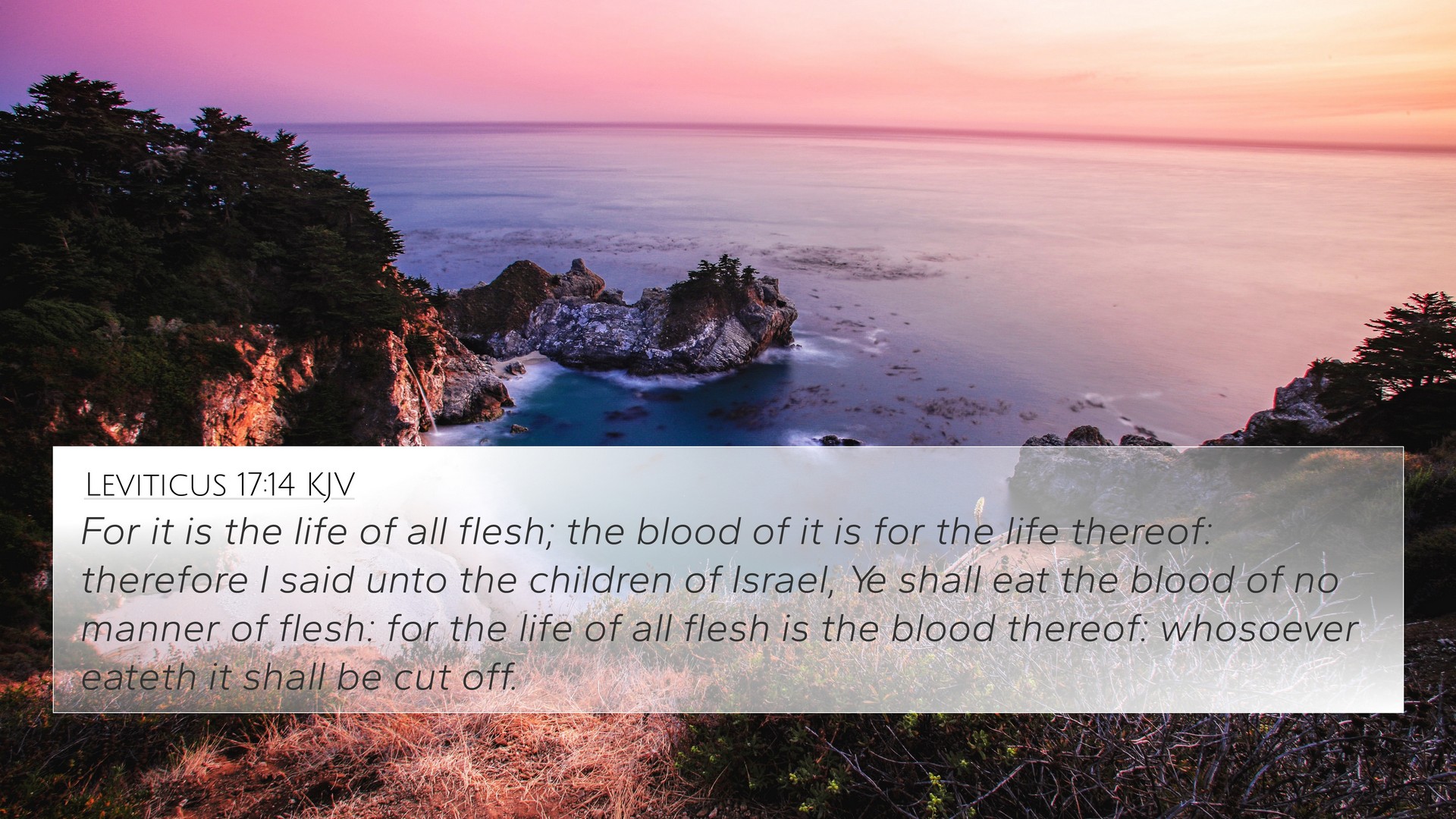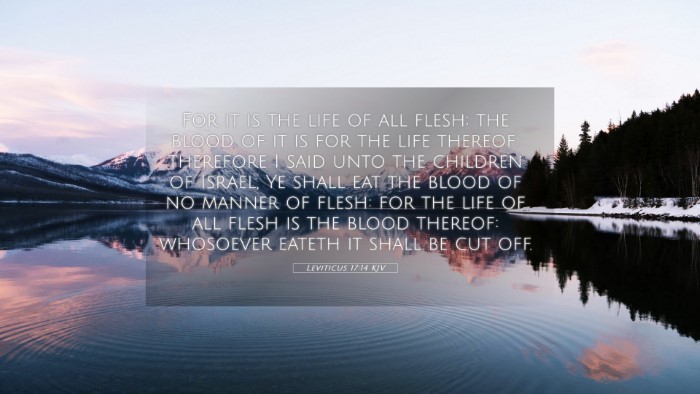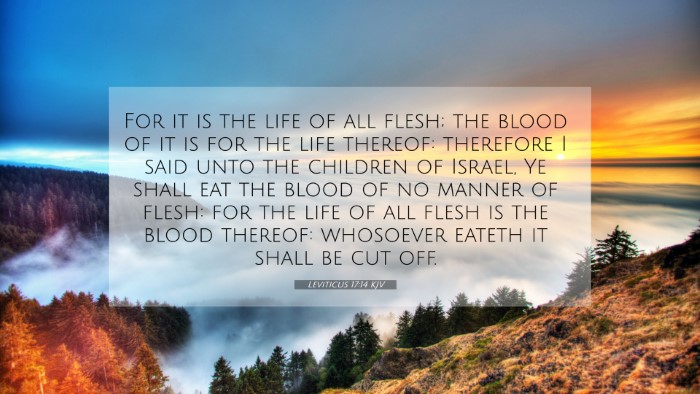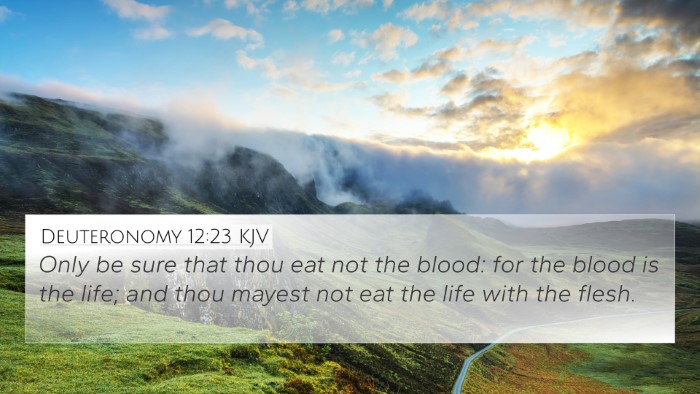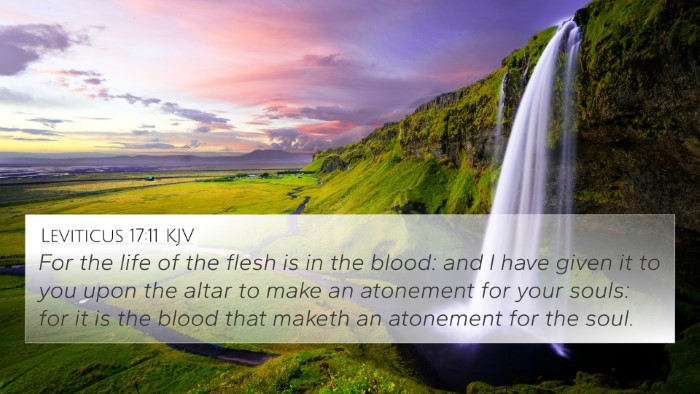Understanding Leviticus 17:14
Leviticus 17:14 states: "For it is the life of all flesh; the blood of it is for the life thereof: therefore I said unto the children of Israel, Ye shall eat the blood of no manner of flesh: for the life of all flesh is the blood thereof: whosoever eateth it shall be cut off."
Summary of Leviticus 17:14
This verse serves as a formal injunction regarding the consumption of blood in the Israelite community. The stipulation underscores the sacredness of life and highlights the theological importance of blood, which symbolizes life itself. By forbidding the eating of blood, God emphasizes the interconnectedness of life and the acts of worship and atonement.
Theological Significance
Blood is not only a physical substance but also a significant symbol in the spiritual context. According to Matthew Henry, the blood represents the soul or the very essence of life. Consuming blood would imply a disregard for life and undermine the reverence God demands from His people.
Albert Barnes adds that the prohibition serves to distinguish Israel from other nations, who may have practices that involve blood consumption. This separation is crucial in maintaining the holiness and uniqueness of God's chosen people.
Albert Barnes' Interpretation
Barnes emphasizes that the blood symbolizes a covenant relationship with God, particularly in how it relates to sacrificial offerings. The sacrosanct nature of blood in sacrificial rituals reflects God's desire for atonement and reconciliation with His creation.
Adam Clarke’s Commentary
Clarke notes that the prohibition is rooted deeply in the understanding that blood represents life, invoking a necessary respect for both life and death. He highlights the critical view of blood that transcends the physical act of the dietary law, inviting a broader theological discussion about sacrifice, redemption, and moral clarity.
Cross-References to Leviticus 17:14
Leviticus 17:14 is intricately linked to various other scriptures within the Bible:
- Genesis 9:4: "But you must not eat meat that has its lifeblood still in it."
- Exodus 12:13: "The blood will be a sign for you on the houses where you are; and when I see the blood, I will pass over you."
- Leviticus 7:27: "Anyone who eats blood must be cut off from their people."
- Hebrews 9:22: "In fact, the law requires that nearly everything be purified with blood, and without the shedding of blood there is no forgiveness."
- 1 Peter 1:19: "But with the precious blood of Christ, a lamb without blemish or defect."
- Matthew 26:28: "This is my blood of the covenant, which is poured out for many for the forgiveness of sins."
- Romans 5:9: "Since we have now been justified by his blood, how much more shall we be saved from God's wrath through him."
Thematic Connections between Bible Verses
The connections between Leviticus 17:14 and these cross-referenced verses speak volumes about the theme of blood in both the Old and New Testaments. The idea of blood as life, covenant, and sacrifice is a narrative thread that weaves through scripture, guiding our understanding of atonement and the significance of Jesus' sacrifice.
Cross-Referencing Biblical Texts
Utilizing tools for Bible cross-referencing can illuminate these connections further. Bible concordances and reference guides can enhance your study and provide a more comprehensive view of how these themes play out throughout the biblical narrative. Methods for cross-referencing scripture often reveal insights that deepen understanding and spiritual wisdom.
For instance, tools like a cross-reference Bible study or a Bible cross-reference system can help identify links between the laws given in Leviticus and their fulfillment in the New Testament. Understanding these connections can aid in sermon preparation, teaching, and personal study.
Conclusion
In conclusion, Leviticus 17:14 is not just a dietary law; it is a deep theological statement about the sanctity of life and the significance of blood in the context of God’s covenant with humanity. By understanding its importance and connecting it to the broader text of the Bible, we enrich our understanding of God's Word and its implications for our lives today.
